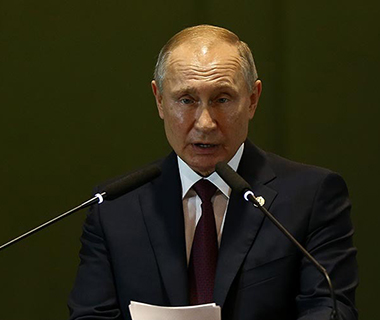Photo: Pedro Ladeira/Folhapress
The Russian Defense Ministry accused the United Kingdom of helping Ukraine launch a massive attack against a Black Sea naval base early Saturday (29) and orchestrating the bombings that destroyed 3 of the organization’s 4 branches. Nord Stream Pipelines.
It is the first time Moscow has accused the Western military alliance, a NATO member, of actively participating in an attack on its infrastructure. So far, the allegations have been of massive shipments of weapons to Kiev from the US and Europe and sharing of intelligence information.
According to the Ministry of Defense in London, the accusations are “false allegations of an epic scale” aimed at detracting from the Russian military’s involvement in the February invasion of Ukraine.
The explosions occurred a month ago in the Nord Stream, which runs more than 1,200 km under the Baltic Sea, linking Russia and Germany in a highly symbolic project that relies on Europeans for natural gas from Moscow.
They are the work of an anti-Russian government, as President Vladimir Putin said at a meeting with international investigators near Moscow on Thursday (27). But he did not name names.
Russian gas is already cut to Europe through Ukraine and a branch of the Turkish system, and is key to pressure on the Kremlin to retaliate against sanctions imposed by the West on its economy.
Earlier, NATO pointed the finger at the Russians, warning Putin that attacks on its energy infrastructure would not be tolerated. This is a sore point, as doctrines on the use of nuclear weapons on both sides provide for their use in times of existential threats against the state.
The attack in Sevastopol, which took place at 4:20 a.m. this Saturday (10:20 p.m. Friday in Brasilia), was the most audacious since the blast earlier this month that hit the Crimea bridge, a symbol of Putin-promoted annexation, in 2014. .
The Black Sea Fleet was a weak force that retreated its most expensive ships to the Sea of Azov, the largest, most protected arm of the body of water. But its base has been Russian since the Romanov Empire, founded in 1783.
Even when Ukraine broke away from the Soviet Union in 1991, an agreement was reached that the Russians would pay to keep troops in Russian-speaking Crimea. In 2014, formalities were dropped.
Thus, the explosions that damaged the minesweeper Ivan Golubets and a containment net in Yuzhnaya Bay carry more symbolic power for a demoralized navy that lost its flagship heavy cruiser Moskva in an attack off the Ukrainian coast in April.
According to military spokesman Igor Konachenkov, nine aerial drones and seven autonomous underwater models were deployed, acting as GPS-guided torpedoes. They damaged a network intended to prevent submarines from entering Sevastopol Bay, where several secondary bays were embedded in a large imperial city like Yuzhnaya.
No injuries were reported. Prior to this attack, the Black Sea Naval Headquarters had been targeted by drones a few times, without major consequences. But the battle, though physically close, only felt more decisive when an air base on the peninsula was attacked and nearly half of the Navy’s naval airfield was destroyed in August.
The explosion of the bridge in Crimea led to a change in the commander of Russian operations in Ukraine and a subsequent wave of attacks on the energy infrastructure of neighboring countries, which already somehow reached 60% of the country’s electricity supply, and winter is at the door.
Source: Folhapress (Igor Gielow)

“Internet evangelist. Writer. Hardcore alcoholaholic. Tv lover. Extreme reader. Coffee junkie. Falls down a lot.”






More Stories
Kamala has warned that democracy in America will be in danger if Trump wins
The world’s rarest donkey has been born at a zoo in the United Kingdom; Watch the video
Senators travel to America in search of best practices…